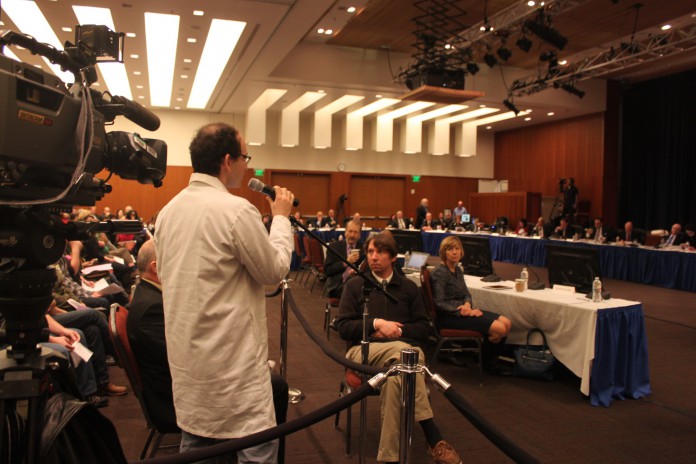
Day two of the University of California Regents meeting at the UC San Francisco campus on Thursday, Jan. 17, commenced with a series of public comment speakers adamantly addressing issues within the UC medical system.
Individuals, including a doctor, medical specialists, nurses, and Kenya Wheeler, a cancer patient and MA student at UC Berkeley, shed light on the range of concerns that have arisen, including the lack of compliance of the UC Student Health Insurance Plan (UC SHIP) to Obamacare’s Affordable Care Act. The majority of speakers entreated that the Board of Regents include these issues in their dialogue to better the way the medical system functions.
The existence of coverage caps for UC SHIP that have severely cost some UC students like Wheeler, who find themselves in the most desperate medical situations, proved to be one of the main concerns.
“With all the tuition and fees we pay, I never imagined that UC’s insurance wouldn’t cover the care I needed,” said Wheeler. “It’s really hard to recover from cancer while having to negotiate sub hospitals by myself to get the care I need without going into bankruptcy.” Building on this conversation, Charlie Eaton, Financial Secretary of UC Student-Workers Union-UAW explained that he and he students he represents are “calling for UC insurance to meet Obamacare standards,” despite the loophole maintained by universities to hold on to such coverage caps.
“Most students don’t know about the caps until it’s too late,” said Eaton. “The care that they might need night not be covered.”
Another grievance, a lack of resources and funding for UC medical facilities to function sufficiently, was a hinted focus of speeches by Randy Johnson, an MRI technologist at UCSF, and Judy McKeever, Registered Respiratory Care Practitioner 2 at the UCSF medical center. In response to the increasing number of inexperienced, temporary graduate students being placed into hospitals to care for patients, McKeever implored that patients would greatly benefit from the hiring of experienced, qualified staff.
“Doctors’ orders are not being followed,” said McKeever. “Errors are being made in patient care and people are being harmed.”
Concerns about the financial accountability of the regents were also expressed. Hank Gehman, a concerned Californian citizen, pointed to UC Berkeley’s new football stadium as what he believed to be a marker of UC’s failure to adequately handle spending.
“[UC] knew they didn’t have the money but violated their own policies and pushed the [Cal stadium] project through regardless,” said Gehman, suggesting that a state-wide electing of regents would improve the quality of the UC system’s decision making and therefore increasefinancial accountability. An underlying message of overall improvement of the UC’s functionality in these areas permeated the public comment forum.
“I believe [governance and finance problems] are tightly linked,”said Gehman. “Constant scrutiny making the regents accountable would be a good next step.”











Hello There. I found your blog using msn. That is an
extremely neatly written article. I will make sure to bookmark it and come back to learn more
of your helpful information. Thanks for the post. I will certainly return.
Medical care in this country has become absurd. There are plenty of other countries with much cheaper costs and exactly the same results. Us who work in the field know how tough things are getting.
Comments are closed.